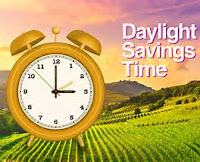In this episode - Spring Forward . . .
Going through the Farmers Almanac, I was curious about Daylight Savings Time. Wondering why do we “Spring Forward?
Tomorrow, the second Sunday, March 14, 2021, at 2 a.m., is when Daylight Saving Time (DST) begins in most areas of the United States.
Be sure to set your clocks one hour ahead before bedtime on Saturday night!
I can hear the naysayers now, “So we lose one hour of sleep Saturday night, huh - What’s the Benefit of DST?
The idea behind moving the clocks twice a year is to take better advantage of the sun’s natural electricity (or light).
Not to worry, your solar panels will do this automatically.
Face it, most folks get out of bed after the sun has risen and go to bed after it has set. But what if the sun rose and set later?
When we spring forward, we’re not really “saving” time; we’re just giving up a little sun in the morning and adding it to the evening.
So will we better utilize the sun’s illumination during this new-found sunlight? Later sunsets cause people to get outside and do more in the evenings.
Ok, but if it’s darker in the morning, doesn’t that mean more electricity will be needed to prepare for school and work?
Since Daylight Saving Time was introduced, lawmakers have occasionally seen fit to fiddle with it. This happened in the 70s, during the oil crisis.
In 2007, Daylight Saving Time got longer, beginning in March and ending in November, instead of April and October, respectively. But it looks like we won’t be doing away with it any time soon.
Which States Don’t Observe DST?
According to U.S. law, states can choose whether or not to observe DST. At present, Arizona (except for the Navajo Nation) and Hawaii, plus a few other U.S. territories, are the only places in the U.S. that do not observe DST and stay on standard time all year long.
Indiana did not vote to observe DST until April 2006. Before that, some counties in the state observed it while others didn’t, which caused a lot of confusion, particularly since Indiana is split into two time zones already!
What about Other Countries?
At least 40 countries worldwide observe Daylight Saving Time, including most of Canada, though most of Saskatchewan and parts of northeastern British Columbia don’t participate.
For obvious reasons, most countries near the equator don’t deviate from standard time.
I’ve heard ’Benjamin Franklin to blame for all this?
Well, yes and no; Ben Franklin is often credited for inventing the idea of Daylight Saving Time due to his partially tongue-in-cheek letter to the editor written in 1784.
However, Franklin seemed to understand rather than changing the clocks, he simply advised us to change our schedules to better align with nature. That seems sensible.
Obviously, changing the number on a clock doesn’t actually add any time to our days.
However, after most of us have gotten off work, adding an hour of daylight to the end of the day can feel like a gift after a long winter of dark evenings.
As the warmer spring weather arrives, nothing could be nicer than having more time in the evening to enjoy it.
Anyway, so tomorrow, we “spring forward,” like to or not.
Won’t you be my neighbor? Welcome spring. If you enjoy our weekly visits, please share them with a friend.
This is Patrick Ball; thanks so much for listening. See you in the next episode.

Comments